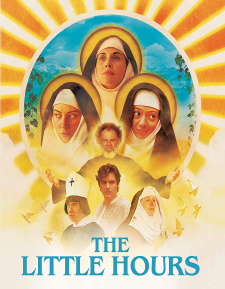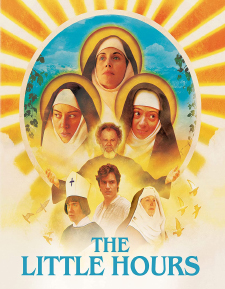Little Hours, The (Blu-ray Review)

Director
Jeff BaenaRelease Date(s)
2017 (June 28, 2022)Studio(s)
Gunpowder & Sky/Vinegar Syndrome- Film/Program Grade: B-
- Video Grade: A-
- Audio Grade: B+
- Extras Grade: B+
Review
Writer/director Jeff Baena’s The Little Hours offers a nearly irresistible setup: a raunchy comedy involving medieval nuns, based ever-so-loosely on stories from Boccaccio’s The Decameron, with the dialogue mostly improvised by a cast that includes Alison Brie, Aubrey Plaza, Kate Micucci, Molly Shannon, John C. Reilly, Dave Franco, Nick Offerman, and Fred Armisen. If that description alone isn’t enough to pique your interest, then nothing that actually happens in the film is going to change your mind. There’s a definite target audience for The Little Hours, and you know who you are.
Baena wrote an 18-page outline for the film, inspired by the first and second tales of the third day in The Decameron, but he left that as a blank slate for the cast to work with. The story involves a servant named Massetto (Franco), who’s on the run after having been caught sleeping with the wife of Lord Bruno (Offerman). After encountering the drunken Father Thommasso (Reilly), he’s invited to hide out in a nearby convent. Since the young nuns are anything but conventional, Tommasso tells Massetto to pretend that he’s a deaf-mute in order to stay out of trouble with them. Yet nothing can protect Massetto from the wiles of Sister Alessandra (Brie), Sister Fernanda (Plaza), and Sister Ginerva (Micucci), so hijinks inevitably ensue.
The Little Hours carries the unmistakable feel of a group of friends getting together for their own amusement, while having little concern for whether or not audiences will come along for the ride. Baena, Plaza, and Shannon had already worked together on Life After Beth, while Plaza and Offerman were veterans of Parks and Recreation. Brie is also married to Franco, while Plaza was in a relationship with Baena at the time of filming (the two later married). That web of connections makes The Little Hours feel like a family affair, though it’s anything but a family film. Everything was shot on authentic locations, but Baena encouraged the actors to play their parts in a contemporary manner, and their frequently salty dialogue is wildly anachronistic. The language is irreverent, and so are the situations, with one of the nuns even being a secret witch.
Despite the debauchery on display, and the life-and-death stakes involved with the story, everything feels oddly harmless, even gentle and laid-back. There may be frequent transgressions in The Little Hours, but the film itself isn’t particularly transgressive. It’s The Decameron as a stoner comedy. It won’t be outrageous enough for some viewers, though it will still be a bridge too far for others, so the target audience is indeed a narrow one. Yet if you’re open to its offbeat and somewhat contradictory rhythms, there’s much in The Little Hours to enjoy. Here’s the acid test: if the thought of Aubrey Plaza playing a nun who swears like a sailor seems inherently funny to you, you’re golden. If not, you may wish to look elsewhere!
Cinematographer Quyen Tran captured The Little Hours digitally using ARRI AMIRA cameras with spherical Cooke S4 lenses, framed at 2.39:1 for its theatrical release. Everything was captured at 3.8K resolution, though there's no information regarding what kind of a Digital Intermediate was used during post-production. (According to Tran, Baena was keen on shooting at 4K, so it's certainly possible that he also insisted on a 4K DI.) In any event, the film was produced at higher resolutions than this 1080p Blu-ray, and the results speak for themselves. The image is as razor-sharp as possible at 1080p, with an abundance of fine detail visible in all of the textures—every thread and every hair is clearly delineated. The contrast is generally strong, though it suffers a bit in a few of the darkest scenes. There's a lot of drab earth tones in the costuming and the locations—which is certainly appropriate—but they serve to throw the lush greenery from the surrounding scenery into sharp relief. It's not a perfect presentation, but short of an actual 4K UHD, it's hard to imagine it looking much better.
Audio is offered in English 5.1 DTS-HD Master Audio, with optional English subtitles. It's a restrained mix, with the surrounds used to provide gentle ambient effects in the exteriors, and reverberations in the interiors. That helps to create a sense of space around the viewer without overwhelming the dialogue, which is always given priority in the mix. Most of the bass is provided by the eclectic score from Dan Romer.
Gunpowder & Sky’s new Blu-ray release of The Little Hours features a reversible insert with different artwork on each side, and includes two “Prayer Cards” (designed by Alessa Kreger) tucked inside. There’s also an embossed slipcover available directly from Vinegar Syndrome, limited to the first 2,000 units, that was designed by Robert Sammelin. This is actually Gunpowder & Sky’s second release of the film, and it carries over the extras from the previous release, while adding two new commentary tracks and several other new extras as well (all of them in HD):
- Audio Commentary with Jeff Baena, Aubrey Plaza, Kate Micucci, Dave Franco, and Alison Brie
- Audio Commentary with Jeff Baena, Quyen Tran, Susie Mancini, and Natalie O'Brien
- Interview with Jeff Baena (11:21)
- Interview with Kate Micucci (9:09)
- Interview with Susie Mancini (11:00)
- The Decameron Live Reading with Jeff Baena, Aubrey Plaza, and Dave Franco (26:27)
- The Decameron Q&A at The Strand Bookstore (14:58)
- Behind the Scenes Footage (8:47)
- Gag Reel (1:35)
- On-Set Antics (4:40)
- Theatrical Trailer (2:06)
- Red-Band Trailer (2:11)
- Commercials (1:51 – 3 in all)
The first commentary keeps up the family affair nature of the whole project by featuring the two couples, along with Micucci. It’s an unsurprisingly chummy track, with the group laughing and joking throughout. There’s plenty of interesting information in it, though listeners do have to sort out the real facts from the sarcasm. Baena does give a helpful explanation for exactly how the process of writing, improvising, and shooting the film actually worked. The second commentary features Baena along with Tran, production designer Susie Mancini, and costume designer Natalie O’Brien. It’s a bit more practical and less lighthearted than the first track, though it’s still fairly cozy. There’s plenty of detail about the locations, design, lighting, and camerawork. (At one point, Baena explains how a gag with an interrupted zoom was inspired by a tracking shot in Blood Simple.)
The interviews stay in the family vein, with Micucci interviewing Baena, and Baena interviewing Micucci (they purposefully overlap some of their questions for each other). It’s entirely in keeping with style of their commentary track together. Baena also interviews Mancini, though in a slightly more serious fashion. The Decameron Live Reading took place in 2017 at The Strand Bookstore, with Baena, Plaza, and Franco reading from the Boccaccio stories that inspired The Little Hours. The Q&A that followed has the trio fielding questions about the making of the film.
The Behind-the-Scenes Footage consists of cell phone clips shot by Micucci (who unfortunately keeps flipping back-and-forth between landscape and portrait). It shows the locations, as well as the cast and crew at work and play. The Gag Reel is oddly abbreviated, like it’s just the first part of a longer reel. The On-Set Antics features just that, with the cast singing, dancing, and generally fooling around—though Reilly does sit down to give a straightforward performance of some Muddy Waters.
It's a well-rounded set of extras, though your patience with some of them may depend upon how you reacted to the film itself. The Little Hours isn’t for everyone, and neither are the extras. For fans, however, there’s hours of content here to devour. It may not win over any new converts, but the cast and crew’s enthusiasm for what they were doing can be infectious, so watch with an open mind. Just remember: Aubrey Plaza as a foul-mouthed nun. ‘Nuff said.
- Stephen Bjork
(You can follow Stephen on social media at these links: Twitter and Facebook.)

